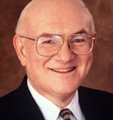
William Schneider
http://www.jewishworldreview.com -- DIVIDED GOVERNMENT is the new reality. But does it mean deals, or does it mean deadlock? Divided government used to mean deals. But more recently, it's come to mean deadlock.
The U.S. has had a lot of experience with divided government. All Republican Presidents for the past fifty years have had to contend with at least one house of Congress controlled by the Democrats.
It used to work pretty well. Even a staunch conservative like Ronald Reagan was able to establish a good working relationship with Democratic House Speaker Tip O'Neill. The two old Irish pols knew how to make a deal.
But by the time George Bush the Father became President, relations between the parties had deteriorated. President Bush's relationship with Senate Democratic leader George Mitchell was tense and difficult, to the point where the Democratic Congress forced the Republican President to raise taxes.
Things got a whole lot worse when Bill Clinton was President and Newt Gingrich became House Speaker. That showdown led to a shutdown.
What changed? The answer is, the parties. They became more ideological.
Back when Franklin Roosevelt was President, the Democratic Party included urban political machines, reform-minded liberals, southern white racists, labor organizers and left-wing socialists. When Eisenhower was President, the Republican Party included Wall Street industrialists, Main Street shopkeepers, Farm Belt isolationists, Yankee liberals and Sun Belt conservatives.
President John Kennedy had to deal with staunch segregationists like Georgia Senator Richard Russell in his own party. President Reagan had to deal with doves like Illinois Senator Charles Percy in his own party.
When the parties were big tents, you had to make deals within your party in order to govern. Now the Democrats are more uniformly liberal and the Republicans are more uniformly conservative. What does that mean? Here's what Sen. Jim Jeffords had to say when he left the Republican Party last week: ``In the past, without the presidency, the various wings of the Republican Party in Congress had some freedom to argue and influence and ultimately shape the party's agenda. The election of George W. Bush changed that dramatically.''
In recent decades, the parties have lost both ideological and geographical diversity.
Take the four current senators who have switched from Democrat to Republican in their careers. Three of the four are southerners: Strom Thurmond of South Carolina, Phil Gramm of Texas and Richard Shelby of Alabama (the fourth is Ben Nighthorse Campbell of Colorado).
Of the ten House Members who switched from the Democrats to the GOP in the last twenty years, eight have been southerners. As Shelby put it when he switched in 1994, ``I thought there was room in the Democratic Party for a conservative Democrat like myself, representing people from Alabama and other areas of the South. But I can tell you, there is not.''
The northeast used to be the homeland of liberal Republicans like Jacob Javits and John Lindsay of New York. Lindsay became a Democrat. Javits was defeated in a Republican primary. Sen. Lowell Weicker of Connecticut left the GOP and got elected governor as an Independent -- after saying, memorably, "Liberal Republicans are no longer a wing of the Republican Party. They're a feather.''
What party switchers have been doing is following the voters of the their respective regions. Southern white voters have been switching from Democrat to Republican for over 30 years. Southern Democratic officeholders have been following them. At the same time, the northeast has been moving in the opposite direction -- more and more Democratic.
In the last three presidential elections, every state in the northeast (New England plus the Middle Atlantic states of New York, New Jersey, Pennsylvania, Maryland and Delaware) has gone Democratic, with the single exception of New Hampshire in 2000. In 1992, Bill Clinton lost seven out of eleven states of the Old Confederacy (Clinton carried his own Arkansas and Al Gore's Tennessee, plus Georgia and Louisiana). 1996 saw virtually the same result: Clinton lost all but four southern states (though not the same four states -- Clinton picked up Florida and lost Georgia in 1996). Last year, the south went completely Republican -- even Arkansas and Tennessee.
When southern Democrats switch to the GOP, they are following the voters. Similarly, Jim Jeffords' decision to leave the Republican Party was not entirely an act of courage. Vermont voted for Clinton twice. Gore carried the state by ten points. Vermont was Ralph Nader's second best state, after Alaska. Vermont's sole House Member, Bernie Sanders, is an independent and a socialist.
The parties have become smaller tents. Inside the tents, party leaders enforce more ideological uniformity -- especially, as Jeffords noted, when the party has a man in the White House. What if most Americans don't want to be governed from the left or from the right? The only way the country can get compromise today is with divided government. But it's harder than it used to be because both parties have come to see compromise as a bad thing.
When Bill Cliton became President, Democrats controlled everything for the first two years and tried to govern from the left. It didn't work. When George W. Bush became President last January, Republicans controlled everything for the first time in almost fifty years. They, too, were overcome by irrational exuberance.
So is compromise now in order? It depends. There's a congressional election next
year, and each party has to decide whether the voters want stark choices or shared
To comment on JWR contributor William Schneider's column, please click here.
05/29/01: The War Between the States is heating up again
05/21/01: The answer is men
05/10/01: Bush v. Carter?
